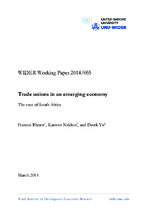| dc.contributor.author | Yu, Derek | |
| dc.contributor.author | Bhorat, Haroon | |
| dc.contributor.author | Naidoo, Karmen | |
| dc.date.accessioned | 2021-03-08T07:24:34Z | |
| dc.date.available | 2021-03-08T07:24:34Z | |
| dc.date.issued | 2014 | |
| dc.identifier.citation | Yu, D. et al. (2014). Trade unions in an emerging economy :The case of South Africa. JEL classification: F50, J30, J51, J52 | en_US |
| dc.identifier.uri | https://doi.org/10.35188/UNU-WIDER/2014/776-9 | |
| dc.identifier.uri | http://hdl.handle.net/10566/5967 | |
| dc.description.abstract | This paper provides a historical overview of the South African trade union movement,
followed by a brief discussion of the labour market legislation and institutions formed since
1994. Thereafter, a detailed evaluation of the impact of trade unions, legislation, and institutions
on labour market outcomes in South Africa is provided, and it is found that despite a long
history, trade union membership levels, their impact on average wage levels, and their pursuit of
strike action, has resulted in relatively benign economic impacts within country and relative to
other economies around the world. The political-economy effects shaping the country’s
employment relations are then discussed. | en_US |
| dc.language.iso | en | en_US |
| dc.publisher | United Nations University | en_US |
| dc.subject | Trade unions | en_US |
| dc.subject | Labour market efficiency | en_US |
| dc.subject | Wage premium, strikes | en_US |
| dc.subject | Political economy | en_US |
| dc.subject | South Africa | en_US |
| dc.title | Trade unions in an emerging economy :The case of South Africa | en_US |
| dc.type | Working Paper | en_US |

